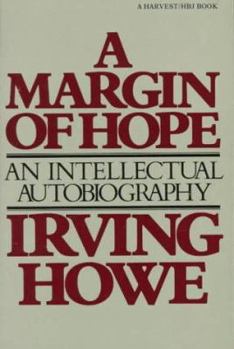A Margin of Hope: An Intellectual Autobiography
Select Format
Select Condition 
Book Overview
A leading literary critic-and the author of World of Our Fathers-looks back on his life from the early 1930s through the 1970s. A perceptive account of Howe's intellectual growth. Index. This description may be from another edition of this product.
Format:Paperback
Language:English
ISBN:0156572451
ISBN13:9780156572453
Release Date:January 1984
Publisher:Houghton Mifflin Harcourt P
Length:376 Pages
Weight:0.81 lbs.
Dimensions:0.9" x 5.4" x 8.7"
Customer Reviews
3 ratings
The most interesting intellectual biography I have read.
Published by Thriftbooks.com User , 19 years ago
This is a superb work examining post-war ideology and political and social thought in the United States. Howe writes with authority as someone who not only watched Socialism evolve and ultimately decline, he also offers a marvellous vantage point for those of us who are fascinated by the rise and fall of American liberalism. You can understand how events both foreign and domestic altered the thinking of so many members of the "New York School" who remain salient and even sagacious voices in modern America: Daniel Bell, Nathan Glazer, Irving Kristol among others. Howe takes you through conversations with Lionel Trilling and Hannah Arendt and you feel as you "listen" that these giants of post-war thought are just a little more human and familiar. In my opinion, that is a gift. There is also a wonderful moment where Howe speaks of discovering the fictional work of Isaac Bashevis Singer while editing a Yiddish literary anthology in the early 1950's. What a discovery! If you have not read either Singer's novels or stories, do! If you are an aspiring academic or life-long student, Howe's peregrinations through the university environment are thought provoking and his engagement with the New Left vanguard in the 1960's expresses the cultural and intellectual divide between older Leftists (some loyal, some not) and their youthful counterparts. For example, men like Howe found it difficult to relate to the privileged "bourgeoisie" reformism of young lions like Tom Hayden when his own generation had seen first hand the depradations of working poverty. Irving Kristol, notably, has written about how poverty inspired he and his comrades to work harder to pursue and receive the blessings of the system. Kristol has noted, as has Glazer, that their generation saw opportunity in the American business and intellectual communities and pursued it finding redemption in the ability to work toward success. This is borne out by Howe who observes the transition from ther pre-WWII anti-Semitism in higher education toward the more egalitarian epoch that began in the early 1950's. This is engaging dialogue and I say "dialogue" because Howe has a discursive style prompting you to think out loud and to wish (I did) that the professor was still with us to field questions. I would also add that for liberals like myself, this is an excellent tour of what liberal thought in America was and has become. I have often wished that some scholar would do for the Left what Russell Kirk did for conservatives and that is write an authoritative history making our intellectual "tradition" a heritage waiting to be claimed. As far as I have seen, this is one of the best books we have to do just that. Whether you are a socialist, liberal, progressive, conservative or none of the above, stumble into this book if you've a moment. It is hardly dry but rather crackles with the wit and avuncularity of its author. Five stars. This book is a rare breed of intellectual autobiography not to be
A man of accomplishments
Published by Thriftbooks.com User , 19 years ago
Irving Howe was a man of many accomplishments. He is perhaps best known for his political writing, his founding of Dissent magazine his championing of a Socialism which did not degenerate into radical hatred of the West and of America. For close to forty years he was at the intellectual center of American life. He was also a great Yiddishist one of the main people in presenting the Jewish secular writing of Eastern Europe to the world. And he was a skilled literary critic , a man of broad knowledge and careful judgment whose special understanding was the realm where politics and literature interconnected. As a writer he was clear and competent. This autobiography it seems to me has very much the flavor of his general critical writing. It seems to me it lacks a deeper dimension of confessional feeling that the greatest autobiographies have. But it is a very workmanlike, responsible piece of craftsmanship.
An intellectual odessy
Published by Thriftbooks.com User , 21 years ago
Though my own inclinations, politically speaking, trend toward the right, I have nevertheless been impressed by the writings of Irving Howe, a socialist who denounced Stalinism, rejected much of the radicalism of the new left, and stayed true to his literary commitments. In short, Howe was a leftist who did not lose his capacity for self criticism. This memoir is a thoughtful look at his life and his relationships with a great many intellectuals of his time, mainly leftists or reformed communists. As the founder of Dissent magazine, Howe is a major force in the history of American letters. And though I still find his ideas on socialism left rather vague (to create a more just society? How, and what, would that be?)he is nevertheless one of the few leftist voices that does not seek to destroy tradition and the past in the name of constructing impossible utopian visions. He also does not have the knee jerk anti-Americanism so prevalent among his successors on the left. His memoir will take readers through his years as a student in New York and an emerging literary power in the world of New York intellectuals. He touches on writers such as Edmund Wilson, Alfred Kazin, Lionel Trilling (and many others), not to mention the editors at Partisan Review, for whom he wrote at one time. An interesting read.






